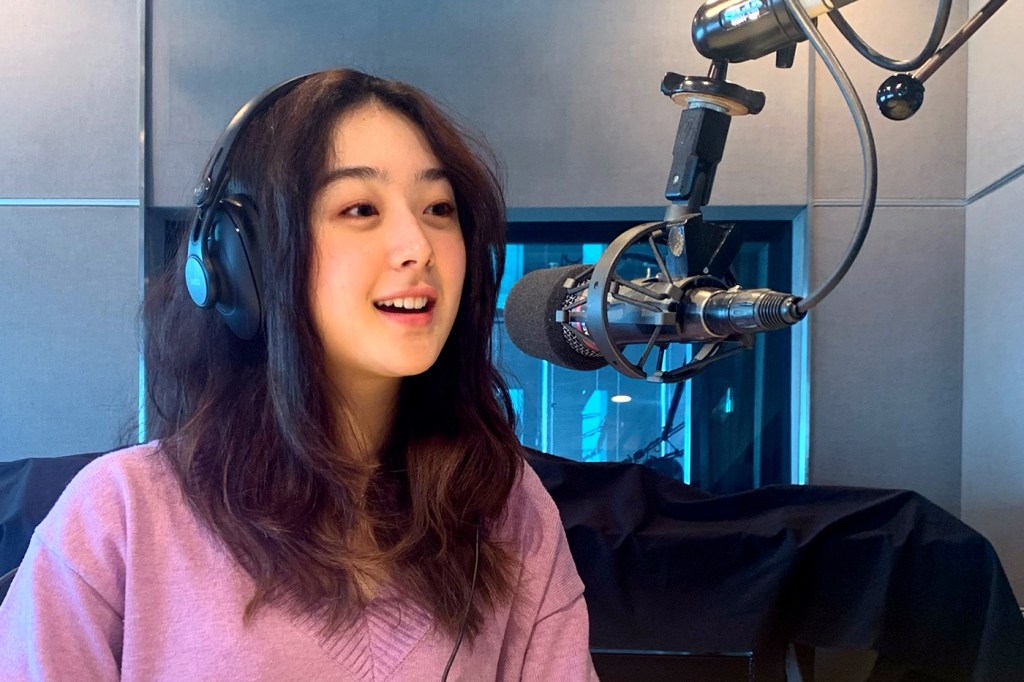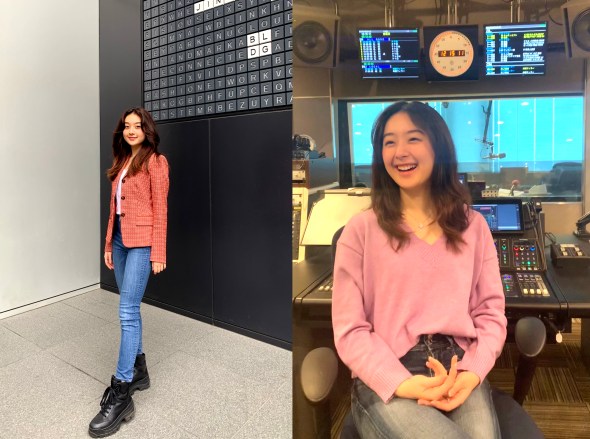For this global co-op, the pandemic struck a creative chord

Japan is experiencing another surge of coronavirus infections and a state of emergency was recently declared in several parts of the country. The summer Olympic games, just two months away, could be in danger of cancellation.
Fortunately for Hana Kabira, a second-year student who is pursuing a degree in communication and media studies at Northeastern, Japan’s restrictive preventative measures haven’t put a damper on creativity, an essential part of her dual co-ops in the Tokyo offices of Universal Music, the multinational music company behind singers such Ariana Grande and The Weeknd, and SPINEAR, a podcasting company.

Photos courtesy Hana Kabira
After a tough fall semester when Tokyo was on lockdown, Kabira grew tired of staying in her living quarters and spending countless hours in front of a computer without a break. Evening curfews ruled out socializing with others past a certain hour. And the 13-hour time difference between Boston and Tokyo messed with her sleep schedule.
“I felt quite stuck and I hit a real wall,” she says in an online interview from her home in the Japanese capital, where it was approaching midnight. Kabira was still animated and full of energy, despite the hour, as she recalled what the pandemic was doing to her.
“It caused a lot of stress, and I didn’t understand that stress was a creativity blocker.”
The spring semester marked a turning point.
An online cognition class taught by Allison Baker, an assistant teaching professor in psychology at Northeastern, helped her to see the toll that the pressure and isolation were taking, so it motivated Kabira—who is pursuing a minor in psychology—to do something about it.
First, she was inspired to write a research paper, “The Effect of Forest Therapy on Creativity.” Forest bathing—shinrin-yoku—is the traditional Japanese rejuvenation practice of walking through a forest to absorb the calming sounds, smells, and sights.
Then, Kabira applied to six internships in her native country and was accepted to two of them.
“That was a big turn in my life,” she recalls. “It taught me the importance of letting go and not always being in control, which sparked creativity.”
Though both of her co-ops are remote, the concurrent roles allow her imagination to flourish while keeping safely distanced from others.
At Universal Music, Kabira’s co-op on the digital media team involves online meetings to discuss new music projects with record labels and collaborating with co-workers in other countries. “It’s been really nice to work with such innovative and forward-thinking professionals who are always asking for my candid opinion,” she says.
Universal Music was the last of the six internships she applied to. It was an ad for Korean boy band Tomorrow X Together, one of the label’s artists on YouTube that sparked her interest. “I guess I’m applying then,” she recalls thinking.
At SPINEAR, Kabira narrates podcasts geared toward Generation Z, which typically refers to people born between 1997 and 2015. The topics focus on whatever issues may capture their attention, and the most effective marketing and social media channels to reach them.
“To be creative in both fields, music and podcasting has been quite unique and interesting,” Kabira says. “There’s a lot of freedom in both companies.”
Japan has gotten off to a slow start with COVID-19 vaccinations for reasons that include a long mistrust of vaccines. The country administered more than six million doses, or about 2 percent of the country’s population, which makes Japan one of the world’s least inoculated against the coronavirus per capita.
The Japanese government recently created a website for people 65 years and older to book their shots. Kabira’s grandfather, who is 93, got one of the slots. “We’re glad that at least somebody in the family can actually get the vaccine,” she says.
Decades earlier, it was her grandfather’s desire to start the first radio station in U.S.-occupied Okinawa that fueled the family’s relationship to the arts and media. He left the island to successfully pursue a master’s degree in the United States before returning home to get the station up and running. Kabira’s parents were also involved in radio, while an uncle pursued the allure of the theater.
“I was not expecting to get into the music industry like my parents, but I guess somehow something led me there,” she says.
That random something may have been the same guiding hand that lured Kabira to Northeastern. She was already admitted into some of Japan’s top schools, but decided to visit a few universities in the United States.
After California it was on to New York, where the experience didn’t turn out so well. So the family traveled to Boston, the last stop on their U.S. itinerary.
“At the last moment, I decided to apply to Northeastern because we went on the campus tour and the co-op program really struck my family and me,” Kabira says. “I decided to make a pros and cons list, and under co-op I put three stars,” she laughs. “I guess I was meant to be there.”
Kabira credits several faculty members, including communication studies professor Tom Nakayama, principal lecturer Bill Lancaster, co-op adviser Jacqui Sweeney, Maggie Loscuito, assistant director of the peer tutoring program, are some of the most influential professors at Northeastern.
“I just started my marketing minor last fall, so I didn’t really have that much knowledge, but Northeastern builds up a really strong foundation,” Kabira says. “Having a lot of diverse students also gives the opportunity to be exposed to different perspectives and ideas.”
For media inquiries, please contact media@northeastern.edu.





